Folks write and write and write about the necessity to decontrol housing building, and but some days it looks like minimal progress is being made. Maybe Sure In My Yard (YIMBY) reformers can be higher off drawing the argument towards zoning as a substitute.
That is actually the view of George Mason College economics professor Bryan Caplan. His new comedian e book Construct, Child, Construct: The Science and Ethics of Housing Regulation makes the illustrated case for eliminating mainly all restrictions on constructing new properties.
That is Caplan’s second comedian e book. His first, 2019’s Open Borders: The Science and Ethics of Immigration, made the novel libertarian case for eliminating all restrictions on immigration. Now Caplan and illustrator Ady Branzei do the identical factor for housing.
In Construct, Child, Construct, Caplan explains to readers why regulation makes housing so costly, how constructing extra of it will decrease costs, and the great knock-on advantages that may circulate from extra reasonably priced shelter.
Need extra on city points like regulation, growth, and zoning? Join Hire Free from Motive and Christian Britschgi.
The e book is a surprisingly thorough treatise on how America, with some severe deregulation, might construct its means out of its seemingly most intractable issues. The occasional look of a city-wreaking Not In My Yard (NIMBU) Uncle Sam and a deregulation-loving Dracula makes it a breezy and entertaining learn for individuals who in any other case do not care a lot about debates over minimal lot sizes.
For this week’s version of Hire Free, I talked to Caplan about why he determined to make the YIMBY case in comedian kind, why abolishing zoning actually is a panacea, and why even egocentric NIMBYs ought to love extra residence building.
Q: Why make the case for extra housing in a graphic novel kind? What do you assume that provides to the argument?
A: There’s a lot high-quality analysis on the market on the subject and but, virtually nobody would ever learn it as a result of most of it’s actually boring. Which signifies that I take a look at this bounty of data that we have got and I am simply sitting there saying, “How might I talk this to anybody else on this planet?” Actually, I am simply in search of a way of getting different folks . The principle pitch that I have been giving for this e book when somebody simply offers me 20 seconds is, “I’ve written probably the most fascinating e book that has ever been written on housing regulation.”


Q: You make the robust case that ending zoning and most constructing rules is a panacea that may clear up so lots of our issues. Why that’s?
A: I’m cautious to not say “clear up” as a result of clear up seems like 100%. What I’ll say is it is like a panacea as a result of it makes a giant dent in a bunch of issues that always we consider as simply individually unsolvable. The concept there’s one coverage that may go and work some magic on all of them concurrently is tough to consider. However that’s my story.


You have simply obtained to undergo subject by subject. I begin off with the fundamentals. Housing regulation has enormously inflated the worth of housing and deregulation would get the worth of housing again down. That is such a big a part of the everyday individual’s funds. Getting the worth of housing down by 50 % isn’t like getting the worth of chewing gum down by 50 %. It’s making a giant distinction within the total lifestyle.
When you notice that, then it is like, “Nicely, nevertheless it’s not going to have equal results on everyone, proper?”
For people who find themselves poor, they proper now spend a bigger share of their earnings on housing, so it is going to give them further assist. That is going to cut back inequality, which is one other factor folks discuss.
There can be plenty of extra employment for folks within the building trade, which is a demographic that has finished actually badly up to now few a long time; non-college-educated males. Nicely, that is mainly the primary sort of those that work within the building trade.
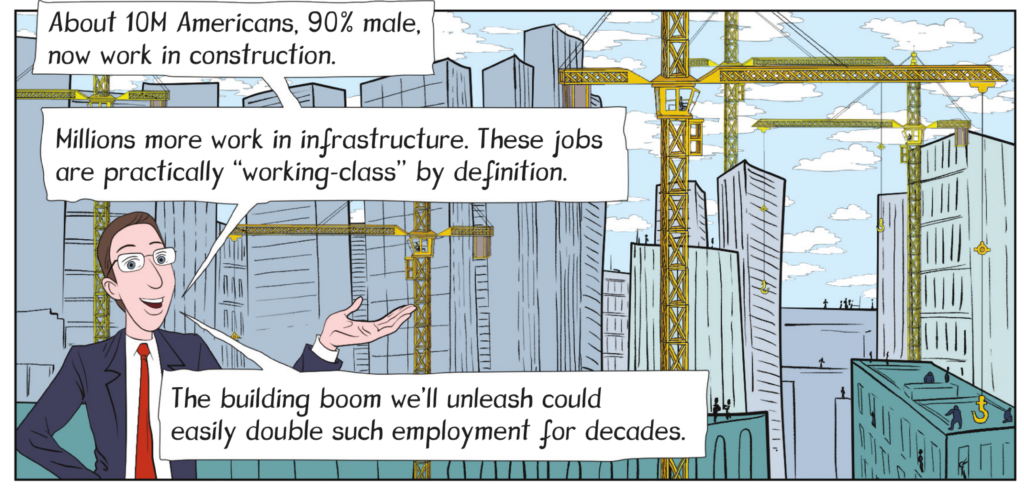

In the event you’re actually fearful about non-college males and the way they’re faring and the way they have not actually tailored properly to a service sector financial system or workplace jobs, right here we have got a technique to go and create plenty of extra conventional masculine, non-college jobs. And as soon as once more, as a result of it’s nonetheless a really massive trade, this is not similar to doubling employment in chewing gum.
Would you like me to maintain happening the checklist of issues or is that sufficient?
Q: Yeah, give me yet another in case you’ve obtained one other one.
A: There is a conventional path of upward mobility that Individuals used to have, which is simply to maneuver to the highest-wage elements of the nation. That is just about foolproof.
You simply say, “I’ll depart the South and go to California,” or “I’ll depart the Midwest and go to New York Metropolis.”
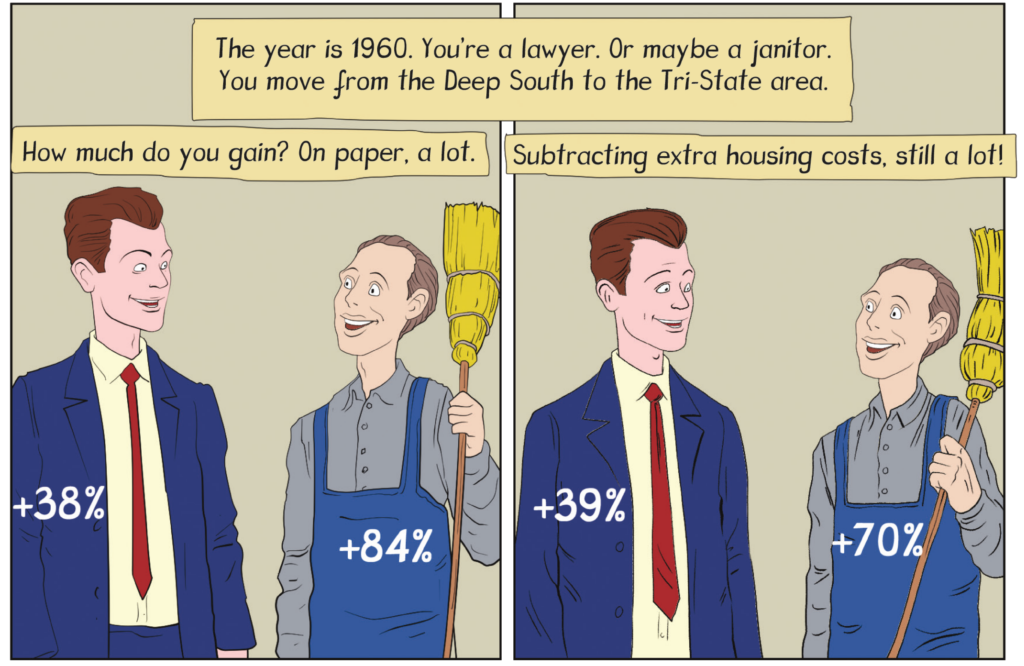

This does not work anymore as a result of housing costs have gotten so excessive in what we name our gold rush areas of the nation that they eat up greater than 100% of the wage features you get.
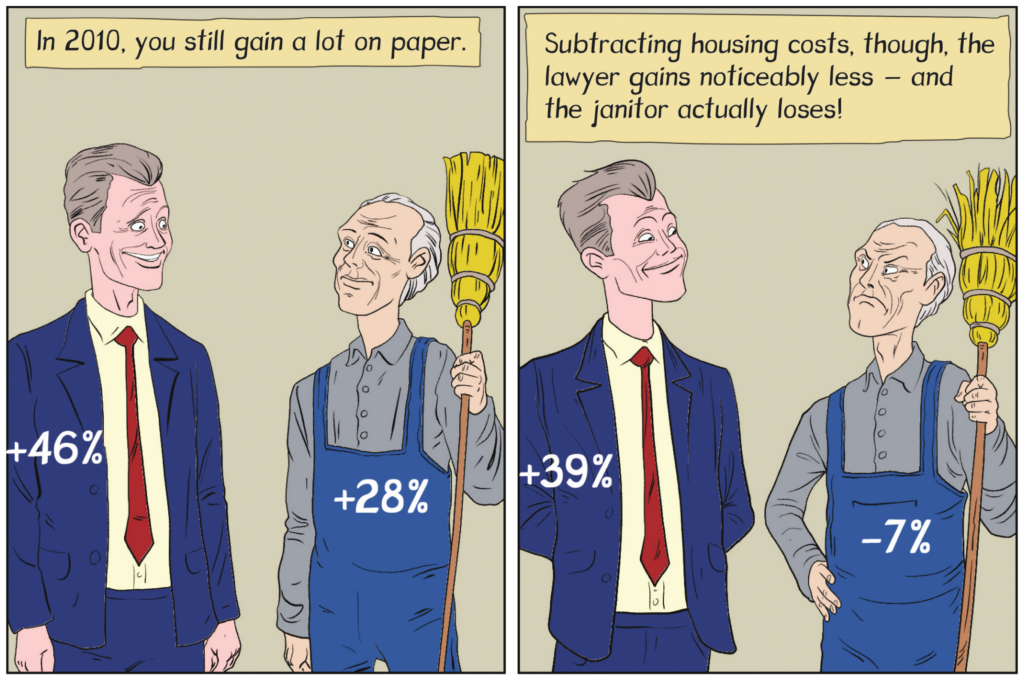

Proper now, we’ve this bizarre, traditionally unprecedented state of affairs the place persons are leaving high-wage areas to go to low-wage areas to get a worse job as a result of the housing value financial savings are so massive, that they’re going to even have a better lifestyle.
You possibly can improve not simply equality, however social mobility by deregulating housing in order that housing costs will probably be decrease within the increase areas.
Q: Your final comedian e book was making the case for open borders. How a lot of a connection do you see between immigration and housing and the novel libertarian place on these points?
A: The massive connection is simply this: In the event you measure how distorted the market is, probably the most distorted market is the worldwide labor market. In the event you perceive your fundamental economics, the extra distorted the market is, the better the features are from deregulation. Housing isn’t as unhealthy because the worldwide labor market, nevertheless it’s actually unhealthy.
We take a product that is a big share of individuals’s earnings and we strangle it in order that it is simply actually arduous to lawfully do the issues which might be bodily doable. That’s only a huge a part of it.
These are insurance policies which might be so taken without any consideration that individuals do not even consider them as coverage. Folks do not often take into consideration immigration restrictions. It is not likely a coverage, it is only a truth of life.
The identical factor goes for housing regulation. You simply stroll round Central Park and look and also you say, “Huh, there are a few skyscrapers right here. In any other case, the park is ringed by a bunch of buildings which might be possibly six tales tall.” Given the profitability of constructing skyscrapers right here in a free market, they’d simply be demolishing a whole bunch of buildings and changing them with skyscrapers.


Q: Your e book presents huge cities as brilliant, enjoyable, futuristic locations. How a lot of the case for cities rests on the aesthetic case and the financial arguments are secondary?
A: For me the economics is unquestionably main. Because of this I needed to do that subject. However I used to be very aware of the truth that for lots of people, it is simply the aesthetics which might be bothering them.
I believe most individuals can get used to plenty of completely different aesthetics, however the established order bias is so robust that in case you’re used to issues trying a sure means, not having skyscrapers round Central Park, then it is simple to persuade your self that is the one great way for issues to look.
What I needed to do on this e book was to combat aesthetics with aesthetics and say, “Look, you are so satisfied it is going to look unhealthy. Let me get my artist to go and draw trying good, and possibly that may open up your thoughts.”
One in all my favourite elements within the e book is I’m hanging out with [Harvard urban economist] Ed Glaeser and I’ve obtained a time machine and I take him again to New York Metropolis proper earlier than they construct the Empire State Constructing and I present him the constructing that was there.
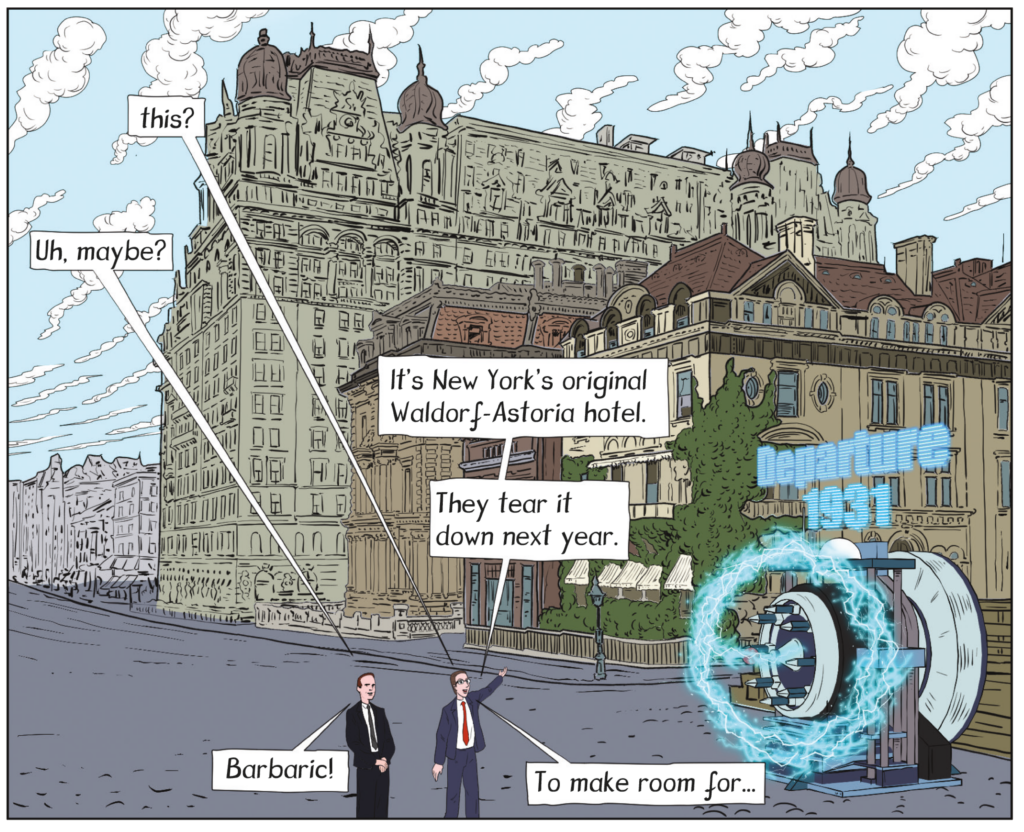

It was the unique Waldorf Astoria lodge, and it is superior. If you see this constructing, it is like you’ll be able to’t do higher than that. And it is like, okay, properly, let’s go ahead within the time machine. It is like two years later, all proper, now what do you assume? Okay, now that is the most effective constructing that would presumably be right here.
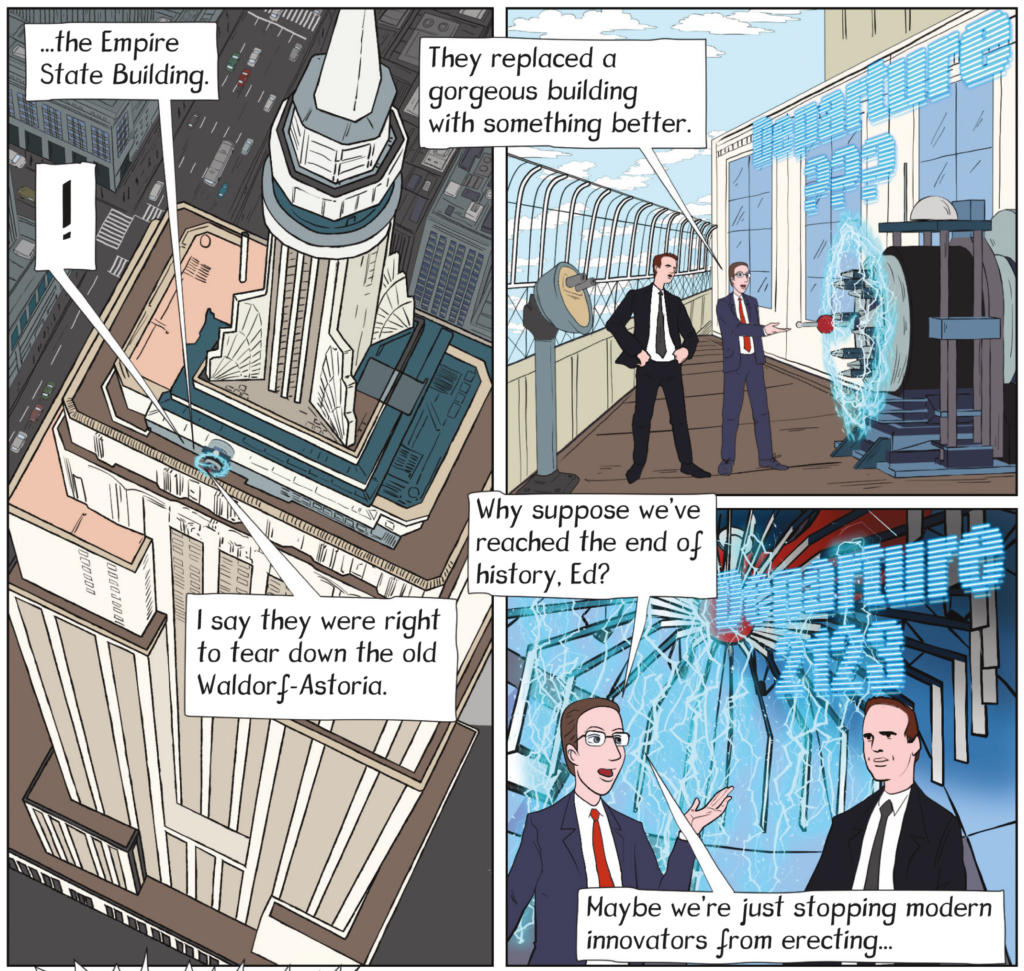

I mentioned, “Look, it is best to all the time be enthusiastic about possibly once we knock down some historic constructing that individuals like, possibly we’re constructing the historical past of the longer term.” Perhaps we’re constructing one thing that individuals sooner or later will say, “That was actually superior.” You do not have to be a Philistine about it and simply say that, “I do not care what it appears like so long as folks pay cash for it.”
Q: A standard accusation you hear is that individuals who oppose new housing are simply attempting to selfishly prop up the worth of their properties. You argue within the e book that NIMBYs ought to assist new housing out of self-interest. Why is that?
A: Folks’s political opinions very reliably have virtually nothing to do with their earnings or their station in life and virtually every little thing to do with their high-level philosophy. In the event you assume their high-level philosophy is only a smoke display for goal self-interest, it simply is not.
There’s been analysis finished on householders versus tenants and the way supportive they’re of recent housing. Tons of tenants are towards deregulation too. They’re the those that bear the complete value of the regulation and so they nonetheless don’t consider [in deregulation]. As a substitute, they make the identical arguments that householders do about neighborhood character, visitors, and parking.
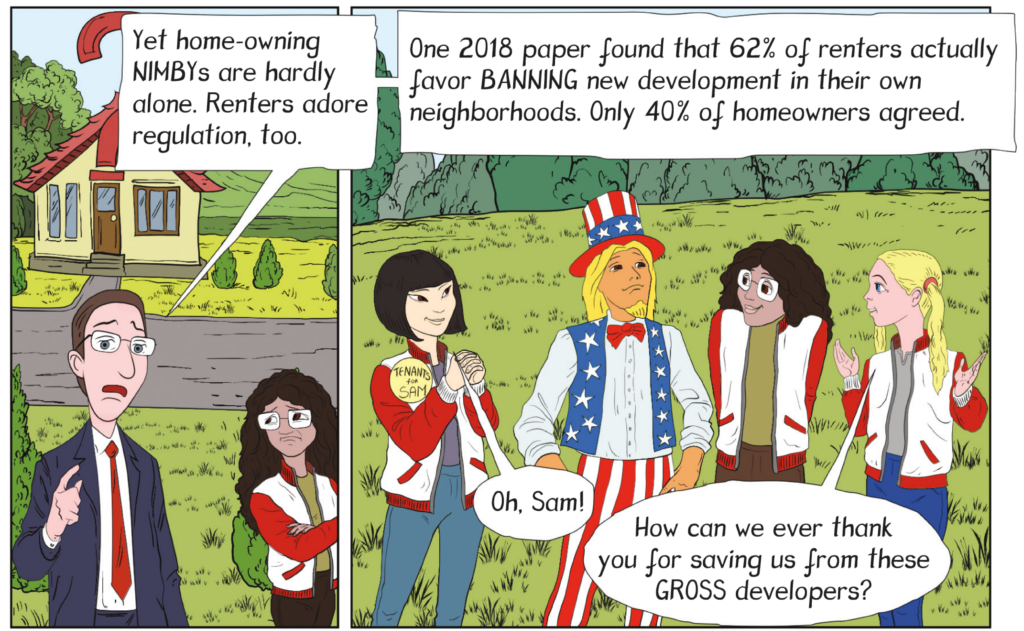

There are precise experiments the place they ask folks to make predictions about what’s going to occur whenever you enable extra building. The median reply in America is nothing. Roughly talking, one-third say, in case you enable new building costs to go up, one-third say nothing occurs, and one-third say they go down. It is probably the most fundamental economics on this planet. And primarily two-thirds of the nation simply says, “No, no. I refuse to consider that.”
In the event you dig deeper, plenty of it is rather like “I simply refuse to consider that builders and landlords are going to be good to folks. Simply since you allow them to construct extra stuff, doesn’t suggest they’re going to minimize the worth.”
No economist ever mentioned they’re doing it to be good. They mentioned they’re doing it to get clients. You chop the worth when there’s plenty of inventory as a result of in case you do not minimize the worth, you’ll be able to’t promote all of it. That is the right story.[pg 46, top four frames; pg 47, whole page]Once more, that is simply not what’s believed by most individuals.
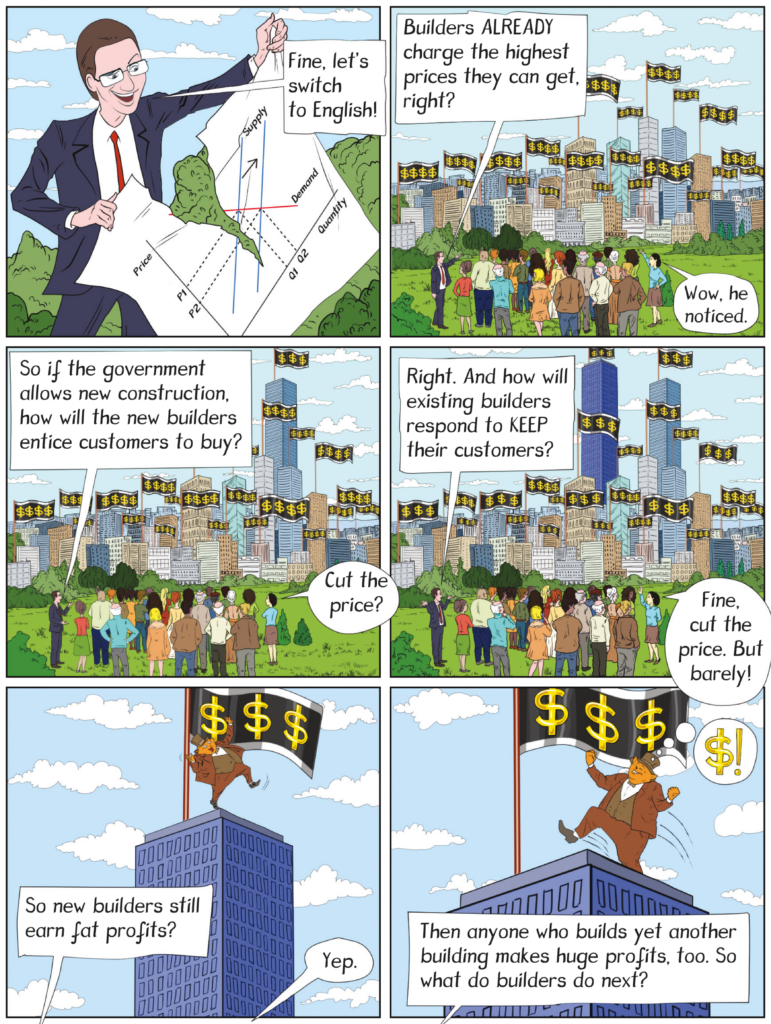

Research have proven that simply telling those that builders will make some huge cash off of a challenge will dramatically scale back the assist for it.
If it was actually self-interest, we might take out our wallets and say, “How a lot cash is it going to take to get you to agree [with housing deregulation]?”
It might be that straightforward. You go to the folks in your historic neighborhoods in San Francisco and say, “We’ll pay double the worth after which it will be authorized. Okay, advantageous, triple. Tremendous, 5 instances.”
There’d be some value the place they’d simply say, “Offered and shut up.” However that is not the best way the true world works. It is extra like a philosophy seminar.
In the event you think about going to a philosophy seminar and simply saying “How a lot cash is it going to take to go and make this entire God subject go away?” It is like this isn’t a difficulty of cash.
Q: Do you assume that if we hadn’t arrange this technique that lets folks complain about new developments in public conferences, folks would not have these attitudes? Or is it pure that individuals do not like change?
I believe it is an interplay between the 2. I believe that it’s completely regular to have a bunch of complaints. However, it is also completely regular to not do something about them.
Earlier than housing regulation was vital, folks nonetheless had been complaining. I simply assume they had been complaining much less as a result of they simply did not really feel as entitled to having a say on what everybody round them does. There was extra of a way of, “Nicely, I do what I need on my property. They do what they need on their property.”
After all, folks complained earlier than we had our present system of housing regulation. However within the earlier system, there simply wasn’t any actual channel for the complaining. It was mainly simply, “Yeah, properly. Too unhealthy.”
Now we’ve plenty of issues we complain about, however they don’t seem to be politicized and so we do not actually give it some thought.
It is like what does the federal government do concerning the unhealthy boyfriend state of affairs? Folks complain about unhealthy boyfriends on a regular basis, nevertheless it’s not like we’ve a Division of Boyfriend Evaluation that may begin licensing boyfriends. That is one factor the place folks simply are like, “All proper. Look, I’ll complain.” Nevertheless it does not actually register that the federal government might do something about it.
When you do create an entire system for going and taking complaints and permitting folks to vent, then it does go and result in much more motion. It results in the creation of people who find themselves skilled complainers—people who find themselves particularly neurotic and troublesome.
Q: Within the e book, you undergo the completely different mental traditions and the way they need to all assist deregulating constructing. Why do you assume folks with such completely different views are arising with the identical coverage options on this one subject?
A: My story is when the proof is absolutely robust, then it’s simply straightforward to go and make the case for a similar coverage from very completely different worth premises. So, in that part, I’m going over the utilitarian, egalitarian, and libertarian views.
Then I additionally do the progressive view versus the conservative view. All of those can latch on to completely different advantages of the coverage and say, “These are my primary arguments.” And what I say is, “Look, you are all right. These are your whole defenses. There’s one thing to them. And if that will get you on board, nice.”
In a means I am pondering if I simply give folks sufficient shrewd arguments, a few of them are going to stay.
Q: The e book is fast-paced, it is optimistic, it is forward-looking. Would you describe your self as optimistic on this subject? Do you assume the YIMBY case will meaningfully change coverage?
A: I am a conditional optimist. The coverage of [housing deregulation] will work wonders. I am unable to say that I am actually optimistic about it when coming anyplace near profitable. My prediction can be one thing like over the subsequent 20 years, housing regulation will get 7 % much less unhealthy. After all, I like the concept my e book will begin a political avalanche and everyone will learn it and folks wave it on the ground of Congress and 50 completely different state legislatures. There’s really a panel within the e book the place each Supreme Courtroom justice is studying my e book. I can dream.
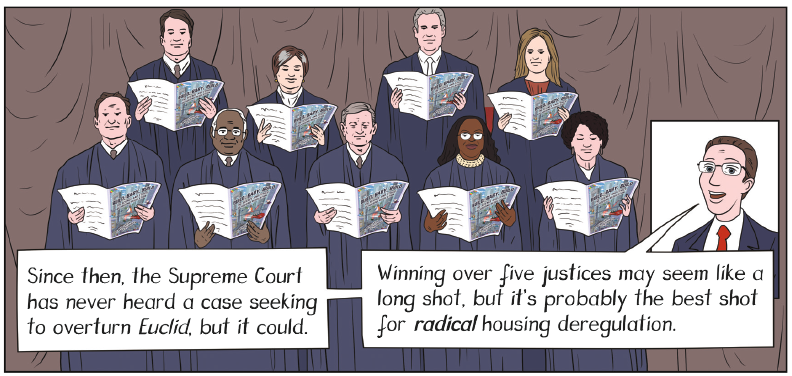

On the similar time, the truth that we obtained to the place we’re is a cause to assume that the political system is absolutely dysfunctional. I believe the basic dysfunction is with the pondering of the everyday voter.
Voters simply are very innumerate. They’re economically illiterate and truthfully simply paranoid. Once I take into consideration speaking to folks about growth, I see weird apocalyptic eventualities they begin portray as if they’re truth. It is astounding to hearken to.
I nonetheless keep in mind within the late ’80s, there was a brand new growth a mile from my home that obtained accepted and my dad was fuming when he got here residence from work. “Are you able to consider these corrupt politicians? They went and allowed this horrible growth.”
The humorous factor is, 30 years later, I keep in mind this argument and my dad had simply fully forgotten it as a result of issues had been advantageous. He stopped complaining as a result of he had nothing to complain about as soon as it occurred. Whereas I sit there saying, “If folks had listened to you it by no means would’ve occurred and there would’ve been no concrete proof that you simply had been flawed.” You have to inexperienced mild stuff to indicate how ridiculous these fears are.
Q: Within the e book, you do give the NIMBYs their due by saying they don’t seem to be essentially flawed about visitors or parking or college capability, however they’re flawed to manage constructing as an answer. How do you cope with authentic considerations about growth?
A: Completely. There is a actually easy technique to go and deal with visitors: cost folks for driving, particularly when lots of people wish to drive! There is a actually easy technique to deal with parking issues: cost folks to park, particularly when lots of people wish to park! What’s the logic of claiming it needs to be free after which saying, and since it needs to be free, we do not need folks round right here?
How about you simply cost folks after which that is your answer? If you regulate housing, there’s a lot collateral injury.
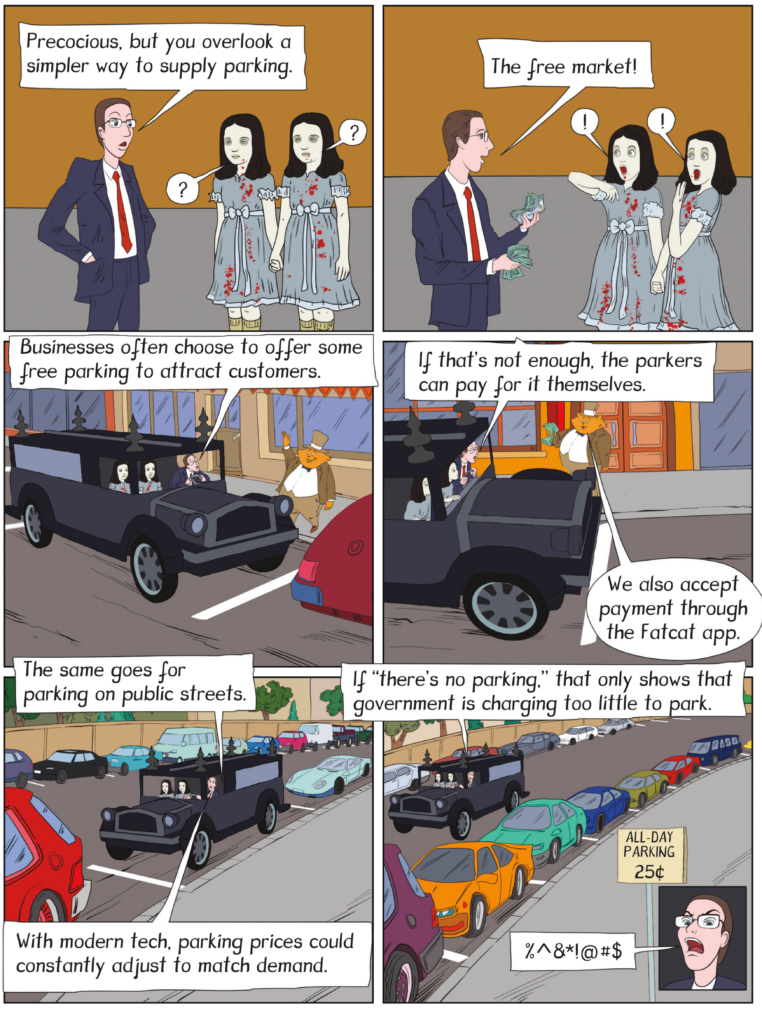

This interview has been condensed and edited for model and readability.
